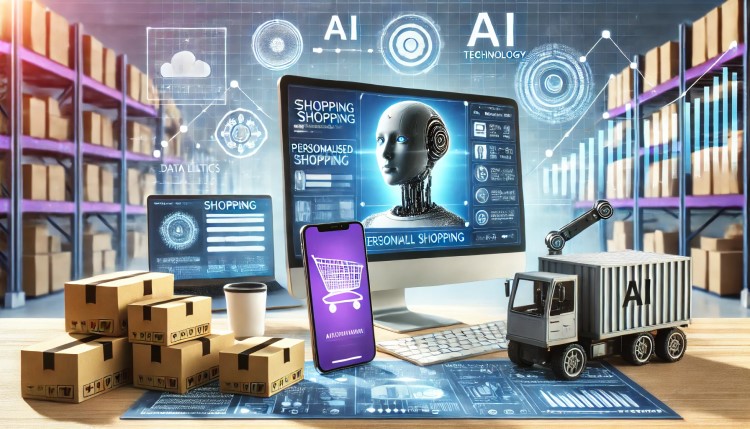Artificial intelligence (AI) is revolutionizing the e-commerce industry, transforming how businesses operate and interact with customers. The impact of AI on e-commerce is profound, driving efficiency, enhancing customer experience, and fostering innovation. As technology continues to evolve, understanding the various ways AI influences e-commerce is essential for businesses aiming to stay competitive. Together, let’s explore the multifaceted impact of AI on e-commerce and its implications for the future.
Enhancing Customer Experience
One of the most significant aspects of the impact of AI on e-commerce is its ability to enhance customer experience. AI-powered tools enable personalized shopping experiences by analyzing customer behavior and preferences. For instance, AI algorithms can recommend products based on previous purchases, browsing history, as well as user preferences. This level of personalization increases customer satisfaction and also boosts sales.
Moreover, AI chatbots provide instant customer support, addressing inquiries and resolving issues in real-time. These chatbots use natural language processing (NLP) to understand and respond to customer queries, offering a seamless and efficient service. Consequently, businesses can improve customer engagement and reduce response times, enhancing overall customer experience.
Optimizing Inventory Management
AI is transforming inventory management, a critical component of e-commerce operations. AI algorithms analyze sales data, customer demand, and market trends to predict inventory needs accurately. This predictive capability helps businesses maintain optimal inventory levels, reducing the risk of overstocking or stockouts.
Additionally, AI can automate inventory tracking and also management, streamlining supply chain processes. Automated systems can monitor inventory in real-time, alerting businesses to low stock levels and automatically reordering products. This efficiency minimizes manual errors and ensures that inventory is always aligned with demand, improving operational efficiency.
Enhancing Marketing Strategies
The impact of AI on e-commerce extends to marketing strategies. AI-driven analytics provide deep insights into customer behavior, preferences, as well as buying patterns. These insights enable businesses to create targeted marketing campaigns that resonate with specific customer segments. Personalized email marketing, for example, can deliver tailored content and offers to individual customers, increasing engagement and conversion rates.
Furthermore, AI-powered tools can optimize ad placements and budgets, ensuring that marketing efforts reach the right audience. By analyzing data from various sources, AI can determine the most effective channels and times for advertisements, maximizing return on investment (ROI). Enhancing marketing strategies with AI helps businesses reach as well as engage their target audience more effectively.
Improving Search Functionality
Improving search functionality is another significant aspect of the impact of AI on e-commerce. AI enhances search engines by understanding user intent and delivering more relevant results. Machine learning algorithms analyze search queries and user behavior to refine search accuracy continuously. This improvement ensures that customers find the products they are looking for quickly and easily.
Moreover, AI-powered visual search tools allow customers to search for products using images. These tools use image recognition technology to identify products and also provide similar recommendations. Visual search enhances the shopping experience, making it more intuitive and engaging for customers.
Streamlining Payment and Fraud Detection
AI is also revolutionizing payment processes and fraud detection in e-commerce. AI algorithms can analyze transaction data in real-time to detect suspicious activity and prevent fraudulent transactions. By identifying patterns and anomalies, AI enhances security and protects businesses and customers from fraud.
Additionally, AI streamlines payment processes by enabling seamless and secure payment options. AI-powered payment gateways can process transactions quickly and accurately, reducing the likelihood of errors. Integrating AI into payment systems improves the overall efficiency and security of e-commerce transactions.
Personalizing Customer Journeys
The impact of AI on e-commerce is evident in the personalization of customer journeys. AI analyzes customer interactions across various touchpoints to create a cohesive and personalized shopping experience. For example, AI can personalize website content, product recommendations, and marketing messages based on individual preferences and behaviors.
This personalization extends to customer support, where AI-powered tools can provide tailored assistance and solutions. By understanding each customer’s unique needs and preferences, businesses can offer a more engaging and satisfying shopping experience. Personalizing customer journeys with AI fosters loyalty and enhances customer retention.
Automating Customer Service
Automating customer service is another significant impact of AI on e-commerce. AI chatbots and virtual assistants can handle a wide range of customer inquiries, from product information to order status updates. These automated systems operate 24/7, providing instant support and reducing the workload on human agents.
Furthermore, AI can analyze customer interactions to identify common issues and optimize responses. This continuous improvement ensures that customer service remains efficient and effective. Automating customer service with AI enhances response times and service quality, contributing to a positive customer experience.
Enhancing Product Recommendations
Enhancing product recommendations is a key benefit of AI in e-commerce. AI algorithms analyze customer data to provide personalized product suggestions. These recommendations are based on factors such as purchase history, browsing behavior, and demographic information. By offering relevant and timely suggestions, businesses can increase cross-selling and upselling opportunities.
Additionally, AI can adapt recommendations in real-time based on customer interactions. This dynamic personalization ensures that product suggestions remain relevant throughout the shopping journey. Enhancing product recommendations with AI improves customer satisfaction and also drives sales growth.
Predicting Trends and Consumer Behavior
The ability to predict trends and consumer behavior is another significant impact of AI on e-commerce. AI analyzes vast amounts of data to identify emerging trends and patterns. These insights help businesses anticipate changes in consumer preferences and market demands.
By understanding future trends, businesses can make informed decisions about product development, inventory management, and marketing strategies. Predictive analytics enable businesses to stay ahead of the competition and meet customer needs proactively. Predicting trends and consumer behavior with AI provides a strategic advantage in the dynamic e-commerce landscape.
The impact of AI on e-commerce is transformative, offering numerous benefits that enhance customer experience, optimize operations, and drive growth. From personalized shopping experiences and improved inventory management to enhanced marketing strategies and streamlined payment processes, AI is revolutionizing the e-commerce industry. As technology continues to advance, the integration of AI in e-commerce will only become more prevalent, shaping the future of online retail. Embracing AI’s capabilities ensures that businesses can stay competitive, meet customer expectations, as well as achieve long-term success.


